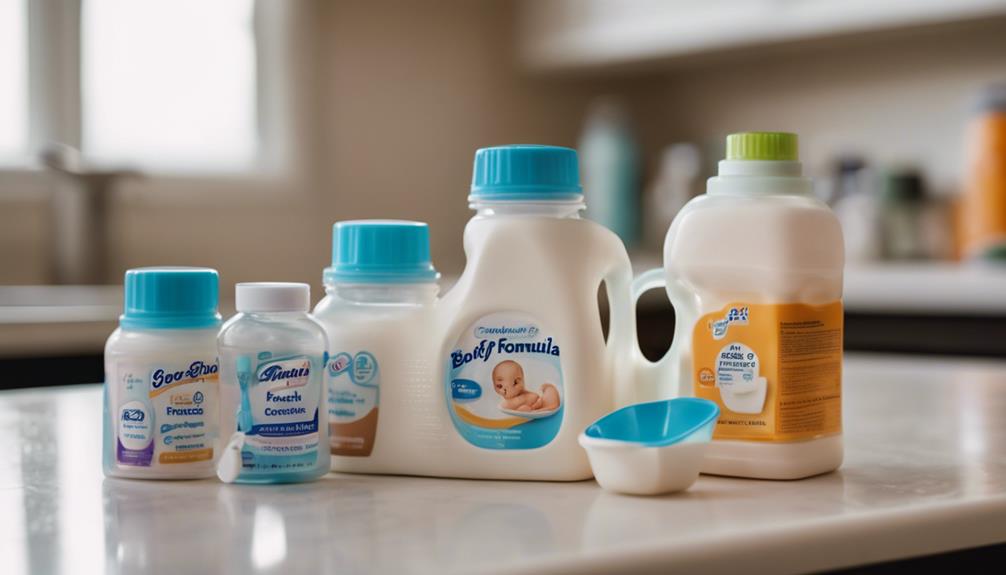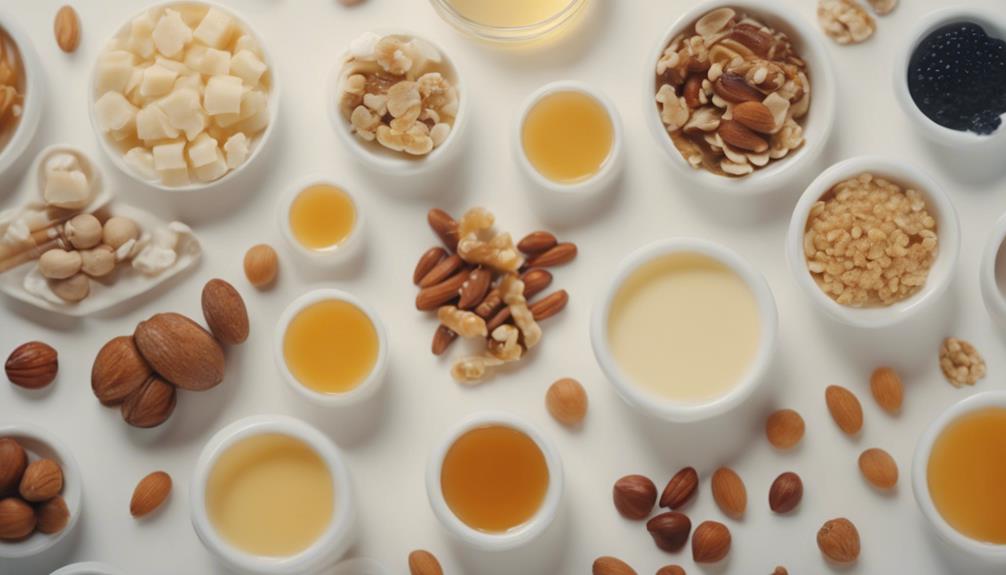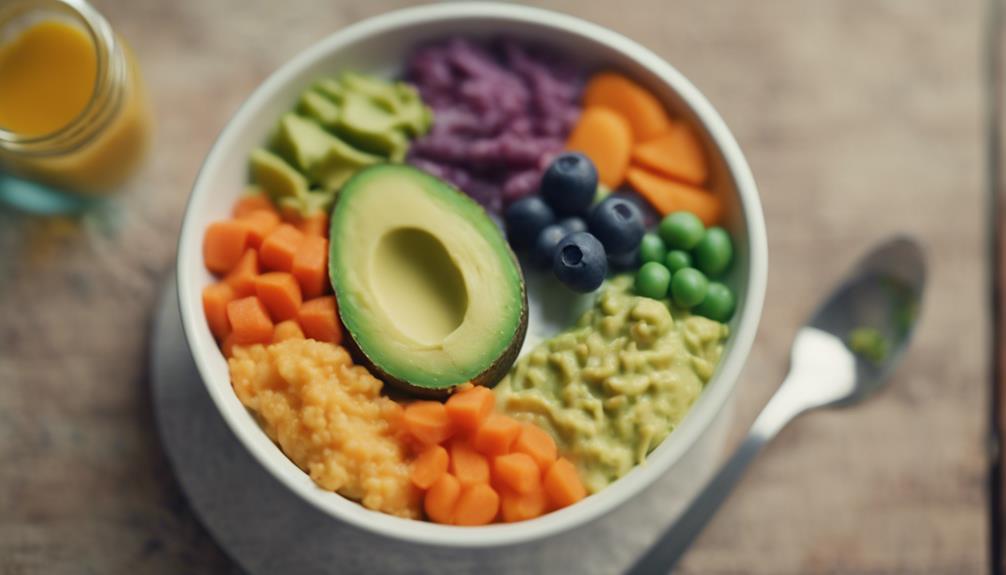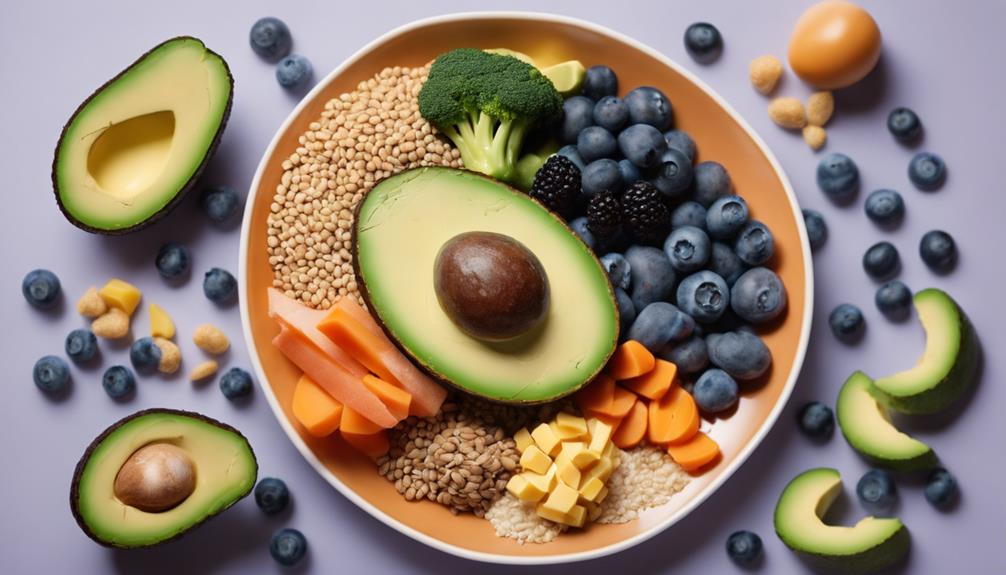To ensure your baby stays healthy, it is important to focus on key aspects of their nutrition. Breastfeeding provides essential nutrients and helps protect against infections. It is recommended to exclusively breastfeed for the first 6 months to provide tailored nutrition. When choosing formula, make sure to do so carefully, mix it correctly, and store it safely. Introducing solids should begin at 6 months, starting with one new food at a time. Be mindful of potential allergies, especially with allergenic foods like peanuts. Avoid giving honey before 1 year of age, cow’s milk before age 1, and always steer clear of unpasteurized foods. Take precautions to prevent choking hazards and promote safe eating habits. A varied diet is key for a healthy baby. Consult healthcare professionals for guidance on introducing solid foods. Your baby’s well-being relies on following these practices.
Key Takeaways
- Breast milk or formula is the main nutrition source.
- Introduce solids around 6 months, one new food at a time.
- Monitor growth and milestones; consult a healthcare provider.
- Avoid honey, cow's milk, and choking hazards.
- Encourage balanced diet, healthy eating habits from the start.
Breastfeeding Benefits
Breastfeeding guarantees essential nutrients and antibodies crucial for your baby's healthy growth and development. The antibodies present in breast milk help protect your little one from infections and diseases, giving them a head start in building a strong immune system.
Healthcare professionals strongly recommend exclusive breastfeeding for the first 6 months of your baby's life. This period of exclusive breastfeeding guarantees that your baby receives the full benefits of tailored nutrition that only breast milk can provide.
Not only does breastfeeding offer unparalleled health benefits, but it also fosters a strong bond between you and your baby. The intimate act of nursing creates a special connection that's both nurturing and comforting for your little one.
Infant Formula Essentials

When it comes to infant formula essentials, understanding how to choose the right formula, mix it properly, and store it safely are key points to keep in mind.
Proper formula selection guarantees your baby receives the necessary nutrients, while correct mixing techniques maintain its nutritional integrity.
Safely storing prepared formula helps prevent contamination and maintains your baby's health and well-being.
Formula Selection Tips
Choosing the appropriate infant formula is crucial for ensuring your baby receives essential nutrients for healthy growth and development. When selecting infant formulas, opt for iron-fortified options to support healthy blood cell development.
Look for formulas that contain essential vitamins like A, C, D, and E to promote overall growth and immunity. Consider formulas enriched with nutrients such as DHA for brain development and probiotics for digestive health.
It's beneficial to choose formulas that mimic the nutritional composition of breast milk to provide your baby with excellent nutrition. Consulting with healthcare providers can offer valuable guidance on selecting the most suitable formula tailored to your baby's specific needs.
Mixing and Storage
To guarantee your baby receives the right balance of nutrients, always mix infant formula properly according to the package instructions. When it comes to infant formula essentials, mixing and storage play vital roles in maintaining your baby's health.
Here are some important points to keep in mind:
- Follow Instructions: Properly mix the infant formula according to the guidelines provided on the packaging to make certain your baby gets the necessary nutrients.
- Storage: Store prepared formula in the refrigerator for a maximum of 24 hours. Remember to discard any leftovers after this time to prevent bacterial growth.
- Avoid Microwaving: Never microwave formula directly in the bottle as it can result in uneven heating, potentially causing burns to your baby.
- Maintain Hygiene: Always use clean bottles and utensils for mixing and feeding formula to uphold proper hygiene standards and minimize the risk of contamination.
Introducing Solid Foods

When it comes to your baby's nutrition, starting to introduce solid foods around 6 months of age is vital for enhancing their diet alongside milk or formula.
Introducing a new food at a time helps in monitoring for any potential allergies or sensitivities in your little one. Keep an eye out for signs such as rashes, diarrhea, vomiting, or changes in behavior after introducing a new food.
It's important to be cautious with foods like peanut butter to reduce the risk of allergies developing in your baby. Babies with eczema or egg allergies may have a higher chance of developing peanut allergies, so monitoring food introductions closely is essential.
Allergenic Foods Caution

When introducing solid foods to your baby, it's important to be cautious with allergenic foods. Start by introducing one new food at a time to monitor for any potential allergic reactions.
Common allergens like peanuts, eggs, and cow's milk should be introduced carefully to prevent adverse reactions in your little one.
Allergenic Foods Introduction
Introduce new allergenic foods to your baby cautiously, monitoring for any adverse reactions that may occur. When starting your baby on peanuts, eggs, cow's milk, or other common allergenic foods, follow these guidelines:
- One at a Time:
Introduce only one new allergenic food at a time. This approach helps pinpoint any specific food that might trigger a reaction in your baby.
- Observation is Key:
Watch for adverse reactions like skin rashes, digestive issues, or breathing difficulties after introducing a new allergenic food. Prompt recognition is essential.
- Risk Assessment:
Babies with eczema or a family history of allergies are at a higher risk for food allergies. Be extra vigilant if your baby falls into these categories.
- Consult a Professional:
Before introducing allergenic foods, consult with a healthcare provider. They can offer personalized advice based on your baby's health and potential risk factors.
Allergy Prevention Tips
To prevent allergic reactions in your baby, introduce one new allergenic food at a time. Common allergenic foods like peanuts, eggs, cow's milk, soy, wheat, fish, and shellfish can trigger adverse reactions in some babies.
Babies with eczema or existing allergies are more susceptible to developing food allergies, so it's important to proceed with caution when introducing these foods. Keep an eye out for any signs of allergic reactions such as skin rashes, digestive issues, respiratory problems, or in severe cases, anaphylaxis, a life-threatening reaction that requires immediate medical attention.
If you notice any concerning symptoms after introducing a new food, consult with a healthcare provider promptly for proper diagnosis and management.
Being vigilant and proactive can help you identify and manage potential food allergies in your baby, ensuring their health and well-being as they explore new foods and flavors.
Foods to Avoid

Steer clear of certain foods to safeguard your baby's health and well-being. Here are some essential foods to avoid:
- Honey: Refrain from feeding honey to babies under 1 year old to prevent the risk of botulism, a severe illness.
- Cow's Milk: Avoid giving cow's milk to babies before age 1 as it can lead to digestive issues and lacks essential nutrients necessary for their growth.
- Unpasteurized Foods: Stay away from unpasteurized foods and drinks to prevent exposing your baby to harmful bacteria like E. coli, which can pose serious health risks.
- Choking Hazards: Be cautious of choking hazards such as hard candy, popcorn, nuts, and grapes. Introduce these foods after age 3 to minimize the risk of choking incidents and safeguard your child's safety.
Nutritional Consultation Importance

Nutritional consultation plays a pivotal role in ensuring your baby receives excellent nourishment and support for healthy growth. Seeking guidance from healthcare providers on infant nutrition is essential for addressing feeding practices, dietary needs, and overall health.
These consultations offer personalized advice on breastfeeding, formula feeding, and introducing solid foods to meet your baby's specific nutrient requirements. By consulting with experts, you can navigate concerns about allergies, intolerances, and special dietary needs to optimize your infant's growth and development. Trusted professionals can provide tailored recommendations to help you make informed decisions regarding your baby's nutrition.
Promoting Safe Feeding Practices

Ensure your baby's safety during feeding by implementing practices that minimize risks and promote a healthy eating environment. Here are some essential tips to guarantee safe feeding practices for your little one:
- Supervise feeding times:
Always keep a close eye on your baby while they eat to prevent choking hazards and promote safe eating practices.
- Avoid unpasteurized products:
Reduce the risk of foodborne illness in infants by steering clear of unpasteurized foods.
- Sit children upright:
Prevent mouth burns from hot foods or liquids by making sure your baby is seated upright during meals.
- Follow food safety guidelines:
Rinse produce thoroughly and adhere to food safety guidelines to prevent contamination and ensure safe feeding practices for your baby.
Frequently Asked Questions
What Are the Nutritional Requirements for a Baby?
To support your baby's growth and health, make sure they receive essential nutrients like calcium, fat, folate, iron, protein, carbohydrates, and zinc. Vitamins A, B, C, D, E, and K are vital for their immune system and development.
What Is the Nutrition Guidance for Babies?
For babies, nutrition guidance involves focusing on breast milk or iron-fortified formula for the first 6 months. Introduce single-ingredient solid foods at around 6 months to watch for allergies. Avoid honey for babies under 1 year.
What Do Babies Need to Be Healthy?
To promote good health, babies require a mix of nutrients like calcium, fat, iron, protein, and vitamins A to K. Make sure they receive these essentials from breast milk, formula, or specialized nutrition if needed, avoiding unsuitable foods.
What Do You Need to Have a Healthy Baby?
To have a healthy baby, you must prioritize essential nutrients like calcium, iron, and vitamins to support growth. Consult experts for advice on feeding, breastfeeding, and introducing solids. Your baby's well-being is your top priority!
Conclusion
To sum up, ensuring your baby receives proper nutrition is crucial for their growth and development. Remember to breastfeed or choose the right infant formula, introduce solid foods gradually, be cautious of allergenic foods, and seek nutritional consultation when needed.
By promoting safe feeding practices, you can help your baby thrive and stay healthy. Remember, a well-nourished baby is a happy baby!










